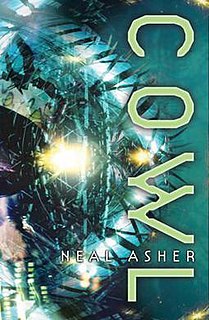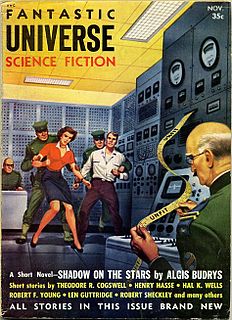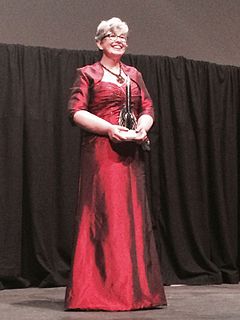
Galaxy Science Fiction was an American digest-size science fiction magazine, published from 1950 to 1980. It was founded by a French-Italian company, World Editions, which was looking to break into the American market. World Editions hired as editor H. L. Gold, who rapidly made Galaxy the leading science fiction magazine of its time, focusing on stories about social issues rather than technology.

If was an American science fiction magazine launched in March 1952 by Quinn Publications, owned by James L. Quinn.
The Internet Speculative Fiction Database (ISFDB) is a database of bibliographic information on genres considered speculative fiction, including science fiction and related genres such as fantasy fiction and horror fiction. The ISFDB is a volunteer effort, with both the database and wiki being open for editing and user contributions. The ISFDB database and code are available under Creative Commons licensing and there is support within both Wikipedia and ISFDB for interlinking. The data are reused by other organizations, such as Freebase, under the creative commons license.

The Magazine of Fantasy & Science Fiction is a U.S. fantasy and science fiction magazine first published in 1949 by Fantasy House, a subsidiary of Lawrence Spivak's Mercury Press. Editors Anthony Boucher and J. Francis McComas had approached Spivak in the mid-1940s about creating a fantasy companion to Spivak's existing mystery title, Ellery Queen's Mystery Magazine. The first issue was titled The Magazine of Fantasy, but the decision was quickly made to include science fiction as well as fantasy, and the title was changed correspondingly with the second issue. F&SF was quite different in presentation from the existing science fiction magazines of the day, most of which were in pulp format: it had no interior illustrations, no letter column, and text in a single column format, which in the opinion of science fiction historian Mike Ashley "set F&SF apart, giving it the air and authority of a superior magazine".

David Rowland Langford is a British author, editor, and critic, largely active within the science fiction field. He publishes the science fiction fanzine and newsletter Ansible.

Interzone is a British fantasy and science fiction magazine. Published since 1982, Interzone is the eighth-longest-running English language science fiction magazine in history, and the longest-running British science fiction (SF) magazine. Stories published in Interzone have been finalists for the Hugo Awards and have won a Nebula Award and numerous British Science Fiction Awards.

Neal Asher is an English science fiction writer. He lives near Chelmsford.

Steven H Silver is an American science fiction fan and bibliographer, publisher, author, and editor. He has been nominated for the Hugo Award for Best Fan Writer twelve times and Best Fanzine five times without winning.

A science fiction magazine is a publication that offers primarily science fiction, either in a hard-copy periodical format or on the Internet. Science fiction magazines traditionally featured speculative fiction in short story, novelette, novella or novel form, a format that continues into the present day. Many also contain editorials, book reviews or articles, and some also include stories in the fantasy and horror genres.
Donald Henry Tuck was an Australian bibliographer of science fiction, fantasy and weird fiction. His works were "among the most extensive produced since the pioneering work of Everett F. Bleiler."

David Geddes Hartwell was an American critic, publisher, and editor of thousands of science fiction and fantasy novels. He was best known for work with Signet, Pocket, and Tor Books publishers. He was also noted as an award-winning editor of anthologies. The Encyclopedia of Science Fiction describes him as "perhaps the single most influential book editor of the past forty years in the American [science fiction] publishing world".

Cowl is a 2004 science fiction novel by British writer Neal Asher. The novel deals with time travel and an epic time war between two factions from the 43rd century. Asher first started working on the novel as a novella named Cowl At The Beginning, which he eventually developed into the full novel Cowl.

InterGalactic Medicine Show was an American online fantasy and science fiction magazine. It was founded in 2005 by multiple award-winning author Orson Scott Card and was edited by Edmund R. Schubert from 2006–2016, after which Scott Roberts took over. It was originally biannual, but became quarterly in 2008 and bimonthly in 2009, except for a brief hiatus in 2010. The magazine ceased publication in June 2019.

Infinity Science Fiction was an American science fiction magazine, edited by Larry T. Shaw, and published by Royal Publications. The first issue, which appeared in November 1955, included Arthur C. Clarke's "The Star", a story about a planet destroyed by a nova that turns out to have been the Star of Bethlehem; it won the Hugo Award for that year. Shaw obtained stories from some of the leading writers of the day, including Brian Aldiss, Isaac Asimov, and Robert Sheckley, but the material was of variable quality. In 1958 Irwin Stein, the owner of Royal Publications, decided to shut down Infinity; the last issue was dated November 1958.

Albedo One is an Irish horror, fantasy and science fiction magazine founded in 1993 and currently published by Albedo One Productions.

Fantastic Universe was a U.S. science fiction magazine which began publishing in the 1950s. It ran for 69 issues, from June 1953 to March 1960, under two different publishers. It was part of the explosion of science fiction magazine publishing in the 1950s in the United States, and was moderately successful, outlasting almost all of its competitors. The main editors were Leo Margulies (1954–1956) and Hans Stefan Santesson (1956–1960); under Santesson's tenure the quality declined somewhat, and the magazine became known for printing much UFO-related material. A collection of stories from the magazine, edited by Santesson, appeared in 1960 from Prentice-Hall, titled The Fantastic Universe Omnibus.

Venture Science Fiction was an American digest-size science fiction magazine, first published from 1957 to 1958, and revived for a brief run in 1969 and 1970. Ten issues were published of the 1950s version, with another six in the second run. It was founded in both instances as a companion to The Magazine of Fantasy & Science Fiction. Robert P. Mills edited the 1950s version, and Edward L. Ferman was editor during the second run. A British edition appeared for 28 issues between 1963 and 1965; it reprinted material from The Magazine of Fantasy & Science Fiction as well as from the US edition of Venture. There was also an Australian edition, which was identical to the British version but dated two months later.
Angela Slatter is a writer based in Brisbane, Australia. Primarily working in the field of speculative fiction, she has focused on short stories since deciding to pursue writing in 2005, when she undertook a Graduate Diploma in Creative Writing. Since then she has written a number of short stories, many of which were included in her two compilations, Sourdough and Other Stories (2010) and The Girl With No Hands and other tales (2010).

Ken Liu is a multiple Hugo Award-winning American author of science fiction and fantasy. His epic fantasy series The Dandelion Dynasty, the first work in the "silkpunk" genre, is published by Simon & Schuster. His short stories have appeared in F&SF, Asimov's, Analog, Lightspeed, Clarkesworld, and multiple "Year's Best" anthologies.

Ann Leckie is an American author of science fiction and fantasy. Her 2013 debut novel Ancillary Justice, in part about artificial consciousness and gender-blindness, won the 2014 Hugo Award for "Best Novel", as well as the Nebula Award, the Arthur C. Clarke Award, and the BSFA Award. The sequels, Ancillary Sword and Ancillary Mercy, each won the Locus Award and were nominated for the Nebula Award. Provenance, published in 2017, is also set in the Imperial Radch universe. Leckie's first fantasy novel, The Raven Tower, was published in February 2019.

















